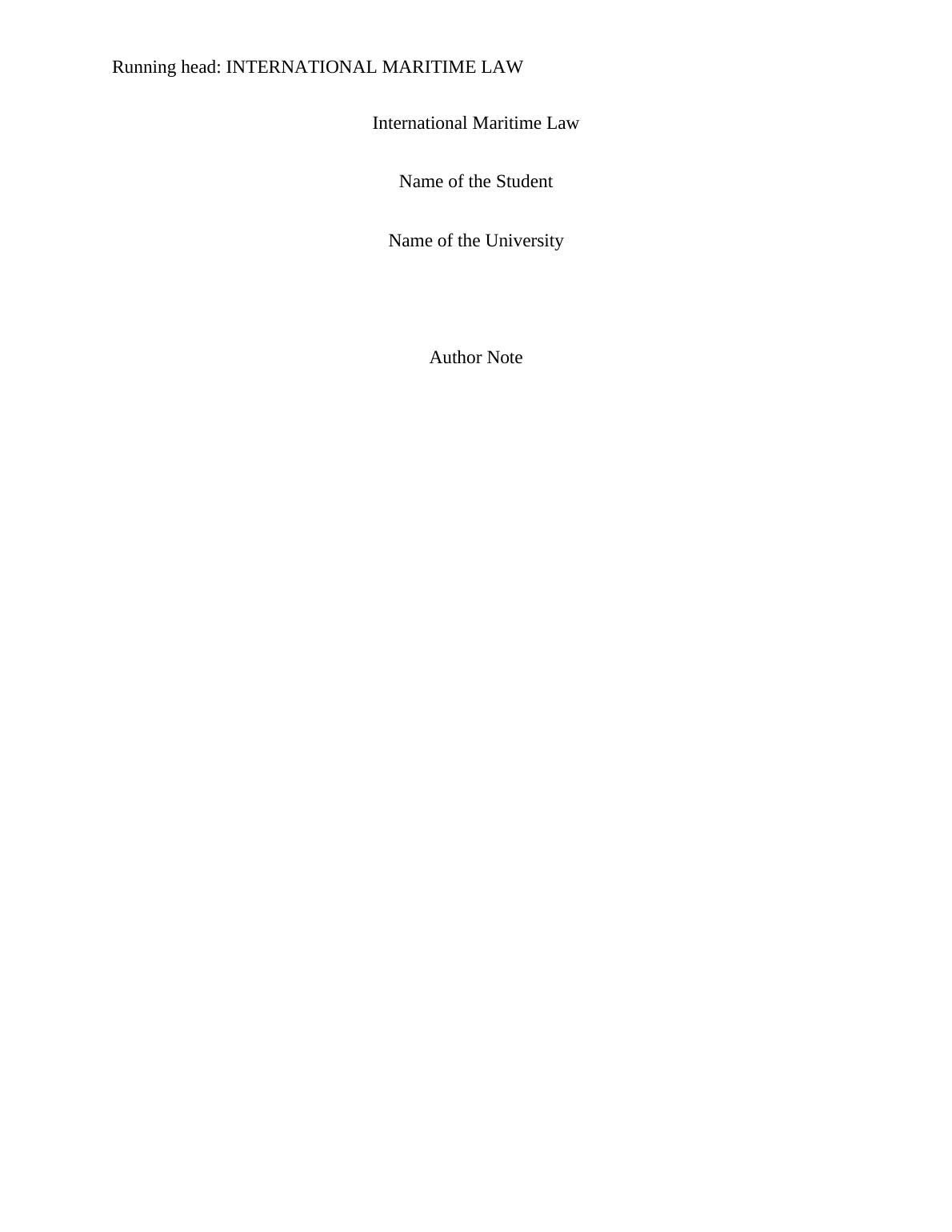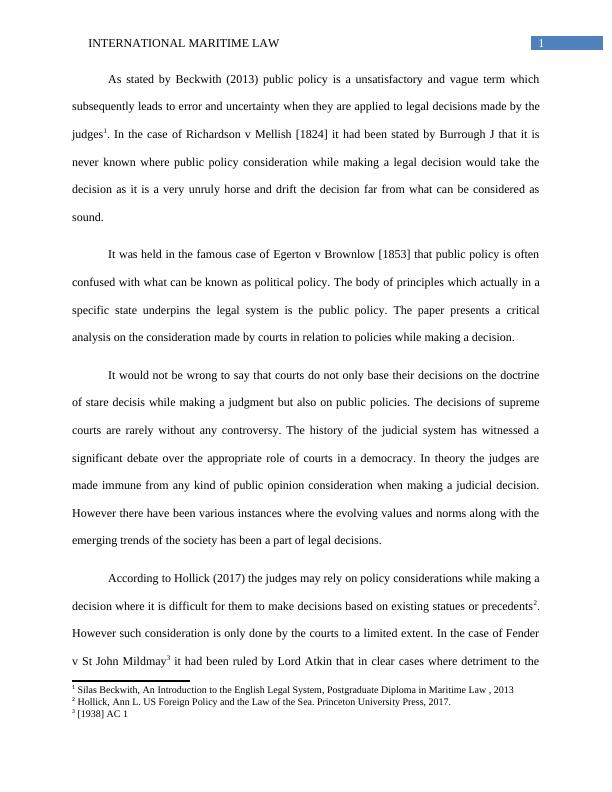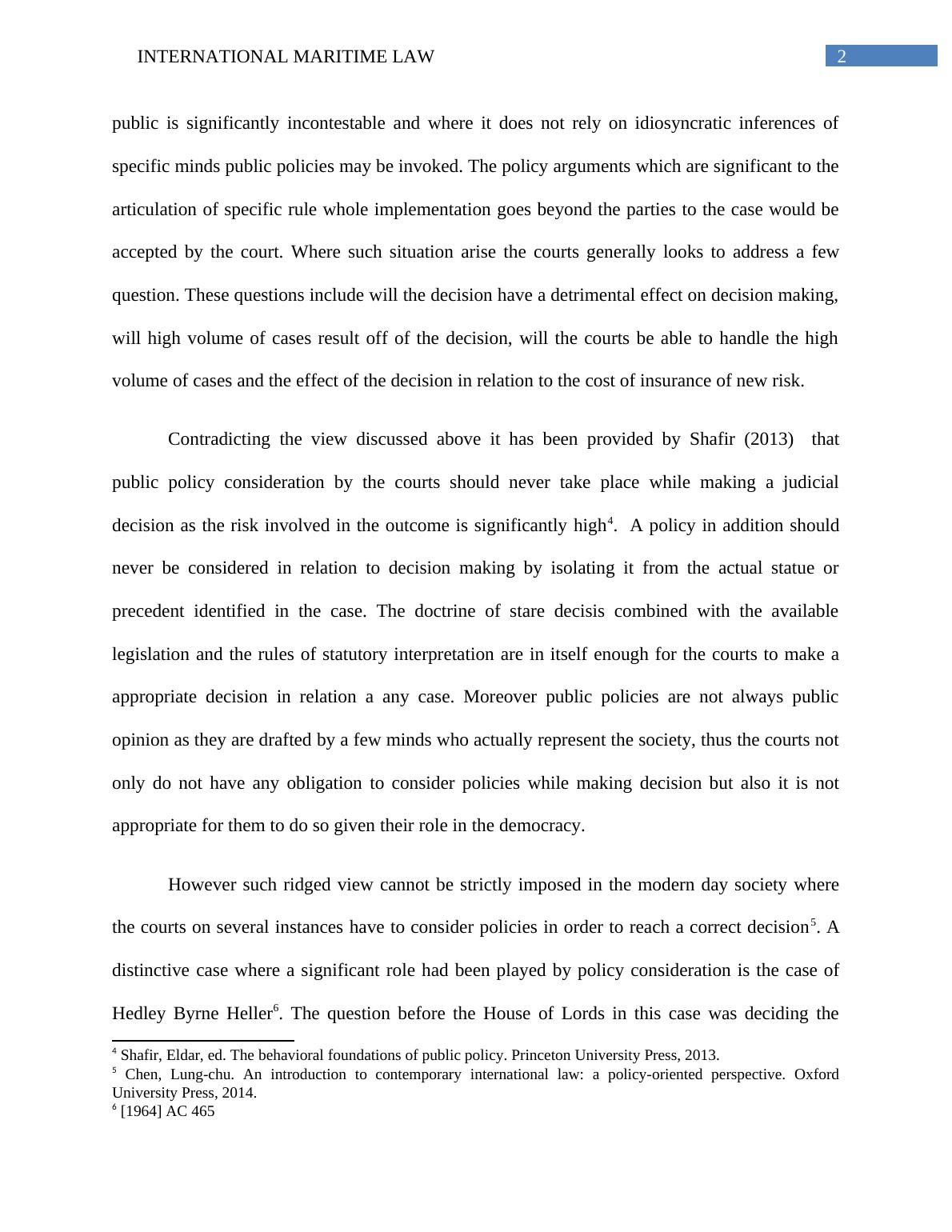Ask a question from expert
Assignment on International Maritime Law
7 Pages1483 Words125 Views
Added on 2020-04-21
Assignment on International Maritime Law
Added on 2020-04-21
BookmarkShareRelated Documents
Running head: INTERNATIONAL MARITIME LAWInternational Maritime LawName of the StudentName of the UniversityAuthor Note

1INTERNATIONAL MARITIME LAWAs stated by Beckwith (2013) public policy is a unsatisfactory and vague term whichsubsequently leads to error and uncertainty when they are applied to legal decisions made by thejudges1. In the case of Richardson v Mellish [1824] it had been stated by Burrough J that it isnever known where public policy consideration while making a legal decision would take thedecision as it is a very unruly horse and drift the decision far from what can be considered assound. It was held in the famous case of Egerton v Brownlow [1853] that public policy is oftenconfused with what can be known as political policy. The body of principles which actually in aspecific state underpins the legal system is the public policy. The paper presents a criticalanalysis on the consideration made by courts in relation to policies while making a decision. It would not be wrong to say that courts do not only base their decisions on the doctrineof stare decisis while making a judgment but also on public policies. The decisions of supremecourts are rarely without any controversy. The history of the judicial system has witnessed asignificant debate over the appropriate role of courts in a democracy. In theory the judges aremade immune from any kind of public opinion consideration when making a judicial decision.However there have been various instances where the evolving values and norms along with theemerging trends of the society has been a part of legal decisions. According to Hollick (2017) the judges may rely on policy considerations while making adecision where it is difficult for them to make decisions based on existing statues or precedents2.However such consideration is only done by the courts to a limited extent. In the case of Fenderv St John Mildmay3 it had been ruled by Lord Atkin that in clear cases where detriment to the1 Silas Beckwith, An Introduction to the English Legal System, Postgraduate Diploma in Maritime Law , 20132 Hollick, Ann L. US Foreign Policy and the Law of the Sea. Princeton University Press, 2017.3 [1938] AC 1

2INTERNATIONAL MARITIME LAWpublic is significantly incontestable and where it does not rely on idiosyncratic inferences ofspecific minds public policies may be invoked. The policy arguments which are significant to thearticulation of specific rule whole implementation goes beyond the parties to the case would beaccepted by the court. Where such situation arise the courts generally looks to address a fewquestion. These questions include will the decision have a detrimental effect on decision making,will high volume of cases result off of the decision, will the courts be able to handle the highvolume of cases and the effect of the decision in relation to the cost of insurance of new risk. Contradicting the view discussed above it has been provided by Shafir (2013) thatpublic policy consideration by the courts should never take place while making a judicialdecision as the risk involved in the outcome is significantly high4. A policy in addition shouldnever be considered in relation to decision making by isolating it from the actual statue orprecedent identified in the case. The doctrine of stare decisis combined with the availablelegislation and the rules of statutory interpretation are in itself enough for the courts to make aappropriate decision in relation a any case. Moreover public policies are not always publicopinion as they are drafted by a few minds who actually represent the society, thus the courts notonly do not have any obligation to consider policies while making decision but also it is notappropriate for them to do so given their role in the democracy. However such ridged view cannot be strictly imposed in the modern day society wherethe courts on several instances have to consider policies in order to reach a correct decision5. Adistinctive case where a significant role had been played by policy consideration is the case ofHedley Byrne Heller6. The question before the House of Lords in this case was deciding the4 Shafir, Eldar, ed. The behavioral foundations of public policy. Princeton University Press, 2013.5 Chen, Lung-chu. An introduction to contemporary international law: a policy-oriented perspective. OxfordUniversity Press, 2014.6 [1964] AC 465

End of preview
Want to access all the pages? Upload your documents or become a member.
Related Documents
Law of Estoppel: Explained with Case Studieslg...
|4
|537
|494
Key Elements of a Judgement and its Role as a Source of Lawlg...
|5
|946
|41
Judicial Review and Democracy in Australian Governmentlg...
|11
|2960
|88
The Doctrine of Judicial Precedent - PDFlg...
|4
|1786
|283
Legal Profession Assignmentlg...
|12
|3540
|136
Piercing the Corporate Veil in Australia: A Discussion on the Courts' Reluctance to Depart from the Separate Entity Principlelg...
|9
|3139
|91